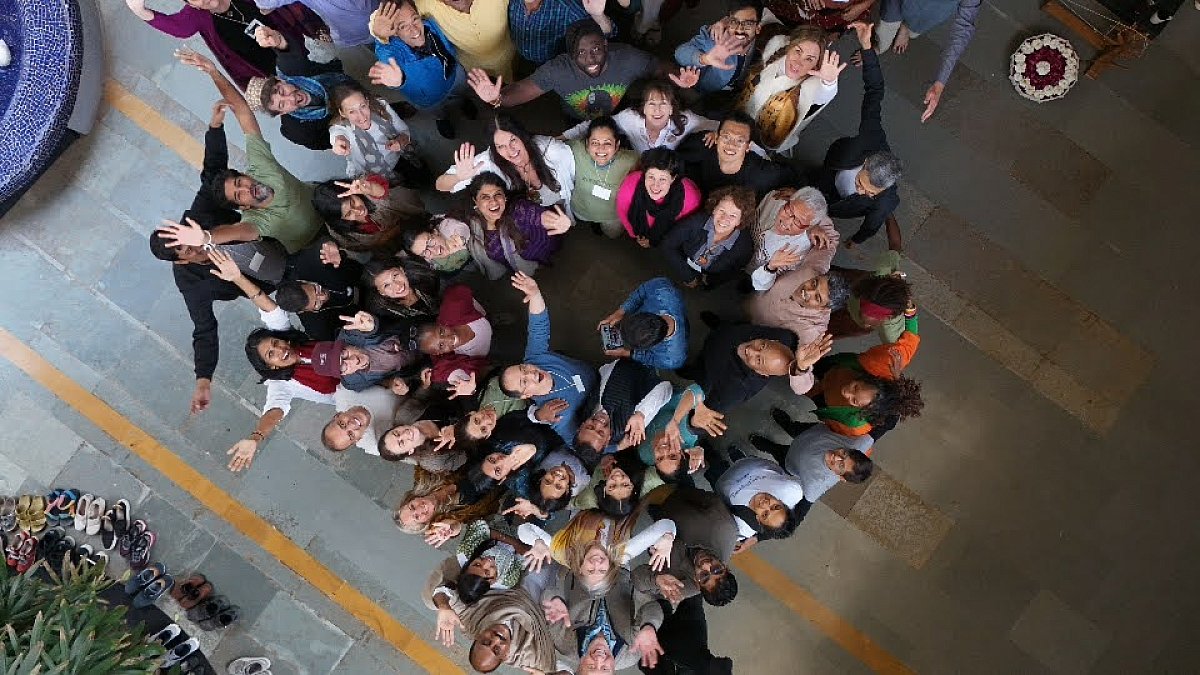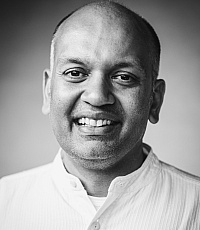Nipun Mehta, Feb 6, 2024 in Gandhi 3.0, 2024
Recently in Vietnam, we held a powerful retreat with farmers around "social permaculture." At one point, Hang-Mai offered a compelling one-liner: "The most common question we get from city people is, 'What to grow here?' Instead of, 'What grows here?'" Such a slight shift, and yet a seed for an entirely different paradigm.
Pioneers from 16 countries flew in for a Gandhi 3.0 retreat, and to double down on "what grows here," there were no agendas, fees, teachers, world views, solicitations, or change-the-world schemes. Over 10 days, practically everyone – ranging from billionaires to folks whose life's possessions fit into a backpack – ended up reporting profound inner transformations. And yet, by the end, no one could singularly describe why. To head into an experience with a beginner's mind is one thing, but to be transformed by it and still come out with a beginner's mind is rare.
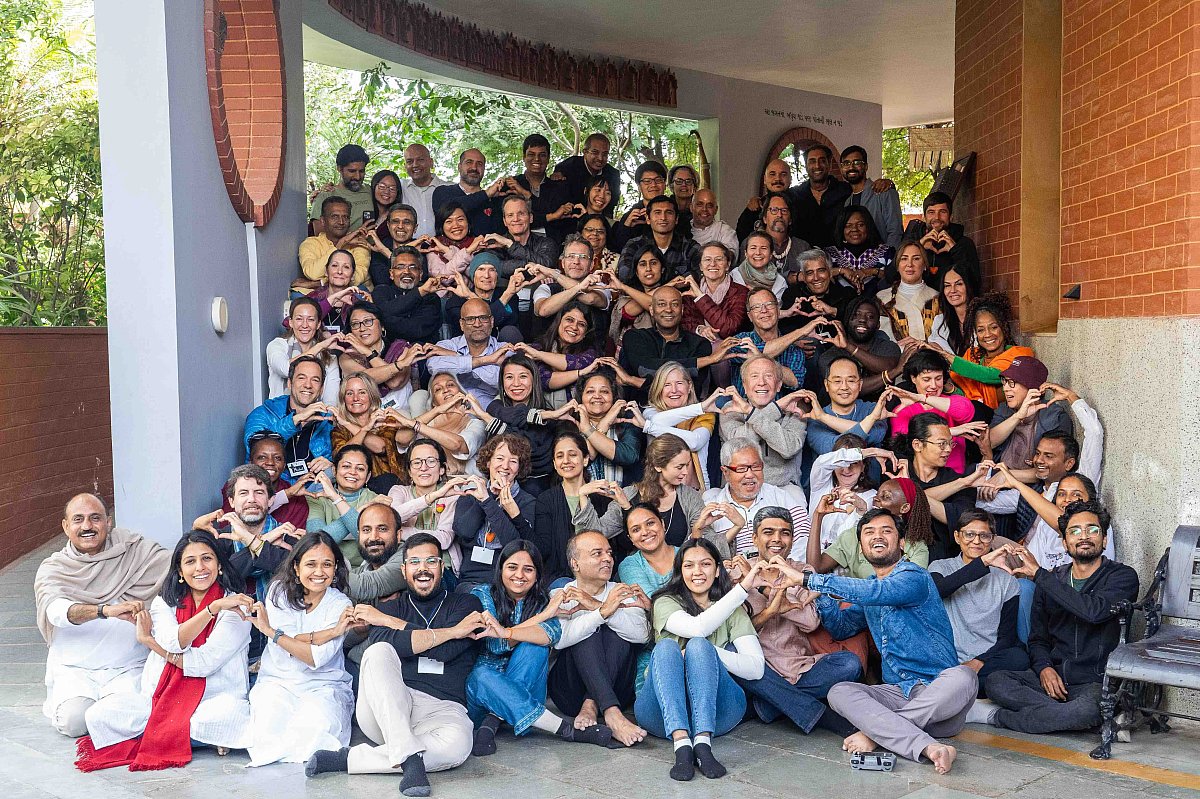
So, what exactly happened? The "Gandhi 3.0" retreat comprises about 40 participants and 40 volunteers. The first five days featured optional immersions into the local culture, and the latter four days featured a collective retreat with "hands, head and heart" engagement. Our days traversed from me (designing for inner transformation) to we (designing for social coherence) to us (designing for emergence), while our evenings traversed silent dinner under the stars, "heartivism" community night at the very location from which Gandhi started his Salt March, to stories (and songs!) of soul force. It was rich with interactions around profound questions like – how do we differentiate inner voice from ego voice? What does it mean for systems to operate with intrinsic motivations? Can we imagine a more infinite game that works for all?
For the two community nights with friends from around the country (and continent), the invite read like this:
In mid-January, noteworthy change-makers from 16 countries are coming to the Gandhi Ashram to ask uncommon questions. Some of them are influencers whose work has impacted billions, while some are invisible ladders whose "deepcast" efforts are vividly felt by the world -- and all of them find themselves holding an underlying sense that today's poly-crises require a more fundamental change to our collective social operating system. Their search brings them to India, to explore "Gandhi 3.0" values, the depth of relationships borne in such a field, and the unexpected emergence that might flow out from there. If, in times of Gandhi, social action organized in one-to-many formation (one Gandhi and many of us), and if his successor, Vinoba Bhave, built a stronger network by walking across India and cultivating one-to-one connections, what is the 3.0 many-to-many version of that uprising of collective "soul force"? Perhaps it rises up like a fountain and spreads in many distributed drops around the world.
A lot can be said about the retreat. For more of a somatic feel, check out this immersion video and the retreat video. An entrepreneur from Vietnam summed it up as, "Gandhi 3.0 unleashed a soul force in me, with more strength and breadth than thousands of hours sitting on the cushion over the last twenty years!"
But How?
What I want to reflect on here is the subtler question: So, how exactly did this happen?
How did busy people agree to fly around the world for a gathering that wasn't designed for any predefined outcome? How did such a diverse array of people and world views, a group of strangers, fall into patterns of social coherence? How did so many experience life transformations, when no one was trying to create them? How did leaders known for elegant articulations, go home to their loved ones with a common refrain, "I don't know how to explain it"?
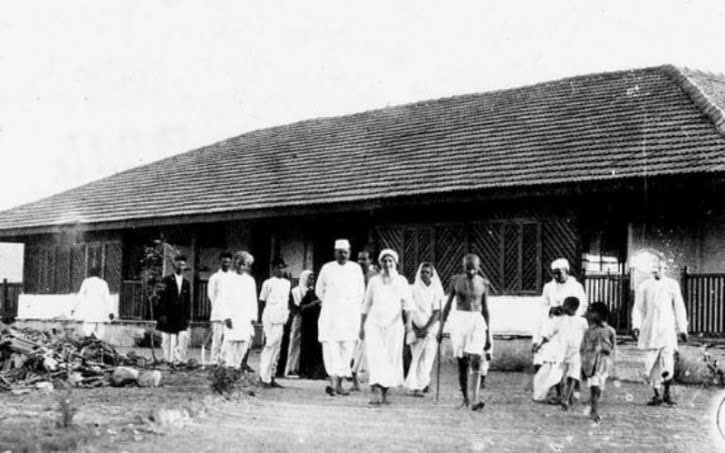 Scientists tell us that 90% of an iceberg is below the surface. All too often, we're optimizing for the tip of the iceberg, counting the fruits of the harvest, but we gloss over the cultivation of the soil from which the fruits grow. Our history books are littered with the power of Gandhi's Salt March, but what is often overlooked is how 78 people who started the Salt March prepared for 15 years!
Scientists tell us that 90% of an iceberg is below the surface. All too often, we're optimizing for the tip of the iceberg, counting the fruits of the harvest, but we gloss over the cultivation of the soil from which the fruits grow. Our history books are littered with the power of Gandhi's Salt March, but what is often overlooked is how 78 people who started the Salt March prepared for 15 years!
At Gandhi 3.0, one factoid is worth unpacking – it took 11 thousand volunteer hours to host this retreat. Typically, volunteer hours are seen as a cost-saving metric. We convert it to dollars per hour, and ascribe some market value to it. But this is *not* that kind of labor. Such labor of love hours are impossible to buy anywhere. It's truly priceless. And without these hours, such Gandhi 3.0 retreat ripples simply cannot manifest.
What is this resource, what makes it so special, and how does that factor into the collective emergence?
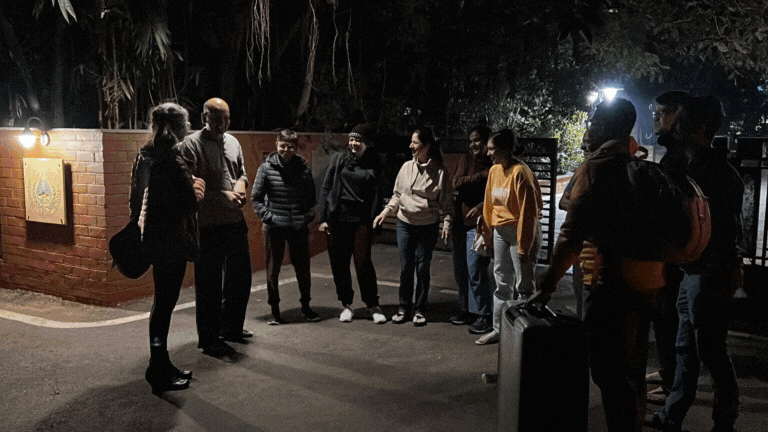 Right as you arrive, volunteer energy is palpable. When a participant lands at the airport, a volunteer is not only waiting for them with a hand-written sign with their name – but also with "welcome" in their native language. As you arrive at the retreat center gate, other volunteers assemble from all directions to sing "appka swagat hai" (welcome song) – it's not professionally sung; it's imperfectly perfect, the way your loved ones would sing it. You are taken to "jet lag cafe", which isn't a actually cafe but a place you can always go for snacks. On your bed, you see "Welcome Home" art – that volunteers have spent countless hours to make for each participant. Among the goodies is a hand-bag titled "No Mud, No Lotus", that isn't just hand-spun yarn ("khadi") but is also lovingly made by women from destitute backgrounds. Everyone also gets a hand-made name tag, behind which are hand-written chants etched while sending "metta" to that specific attendee. As we enter the main hall, the light switches are turned on – but volunteers have practiced that so many times, to do it in a specific way that makes minimal noise. In the center of the circle, a unique "rangoli" features hand-made art made by well wishers across India.
Right as you arrive, volunteer energy is palpable. When a participant lands at the airport, a volunteer is not only waiting for them with a hand-written sign with their name – but also with "welcome" in their native language. As you arrive at the retreat center gate, other volunteers assemble from all directions to sing "appka swagat hai" (welcome song) – it's not professionally sung; it's imperfectly perfect, the way your loved ones would sing it. You are taken to "jet lag cafe", which isn't a actually cafe but a place you can always go for snacks. On your bed, you see "Welcome Home" art – that volunteers have spent countless hours to make for each participant. Among the goodies is a hand-bag titled "No Mud, No Lotus", that isn't just hand-spun yarn ("khadi") but is also lovingly made by women from destitute backgrounds. Everyone also gets a hand-made name tag, behind which are hand-written chants etched while sending "metta" to that specific attendee. As we enter the main hall, the light switches are turned on – but volunteers have practiced that so many times, to do it in a specific way that makes minimal noise. In the center of the circle, a unique "rangoli" features hand-made art made by well wishers across India.
From a cursory glance, one figures that these features render a heartful retreat experience. But when there are literally *hundreds* of things like this, in every corner, from every volunteer, you see that this isn't a todo-list process but rather a different collective intelligence altogether. It's wrapped in a different intention – the story behind the story, the practice behind the practice, the love before it can be named. It's personal and yet impersonal, in a way that the ego is constantly arrested. As one guest noted, "Everywhere I go, I'm a VIP. Except here, and with my wife. :) She tells me that I'm very cerebral, and I always thought that was my strength – but here I can see that I have an underdeveloped heart."
In matters of the heart, VIP indeed gets redefined as a Very Important Process. Everything is verbing. Being, becoming, dissolving, re-emerging. While it's impossible to define that, below are four stages of that unfolding …
#1) When love flows in the tiniest of details, mundane becomes holy. Suddenly, everything matters because everything can evoke the sacred.
Our mic-runner in the conference hall was a young Japanese man named Kotaro. Out of college, he worked at the trillion-dollar Black Rock venture fund; one day, he told his parents, "This can't be my life's calling. I'd like to head to the Himalayas." To which his parents remarkably responded, "What took you so long?" Still in his mid-twenties, he spent three and a half years in deep spiritual practices, including 9 straight months of chanting 13 hours every single day.
And Kotaro flew in from Japan to volunteer … as a mic-runner?!? Yes.
A fellow volunteer, Swara, notices Kotaro's process – start with silence before a circle; when someone raises their hand, move the body swiftly but keep the mind as still as possible; draw as little attention to yourself. Right before delivering the mic, he almost bows. It's a very exacting routine, so Swara asks him, "Can you share how you hand the mic to a speaker?" "Oh, I pray for them before I pass on the mic. Sometimes, with so many hands going up, I get caught up, but maybe 65% of the time I remember." Almost flabbergasted, Swara decides to try it herself. She waits for a hand to go up, triangulating with emcees, participants, circle and other factors, she walks with an inner quietude. As she approaches the participants, she bows, says a prayer and hands the mic. Everyone hears what is said in the mic, but Swara is quietly moved to tears by this very important process – the simple recognition that even mic-running can be a holy act.
Now, if you ask Kotaro, he'll have a similar story to share about Swara. (At a previous retreat, one of the world's leading researchers of compassion, Dacher Keltner, learned of Swara's 3000-kilometer walking pilgrimage without any resources whatsoever; he was so moved that he wrote about her in his best-selling book on Awe!) And likewise, that's true across all the millions of combinations throughout the team of 40-ish volunteers. Each volunteer is stepping up the love, in the *smallest* of ways, in the most veiled corners of the retreat; in doing so, they implicitly give each other permission to do the same. Soon, by organic design, love goes viral.
That essentially is the retreat hosting algorithm: serve without condition, and trust in emergence. Simple, yet hard in practice, because as Bruno Barnhart notes, "We humans prefer a manageable complexity to an unmanageable simplicity." That's what volunteers are here to grok – the simplicity of love.
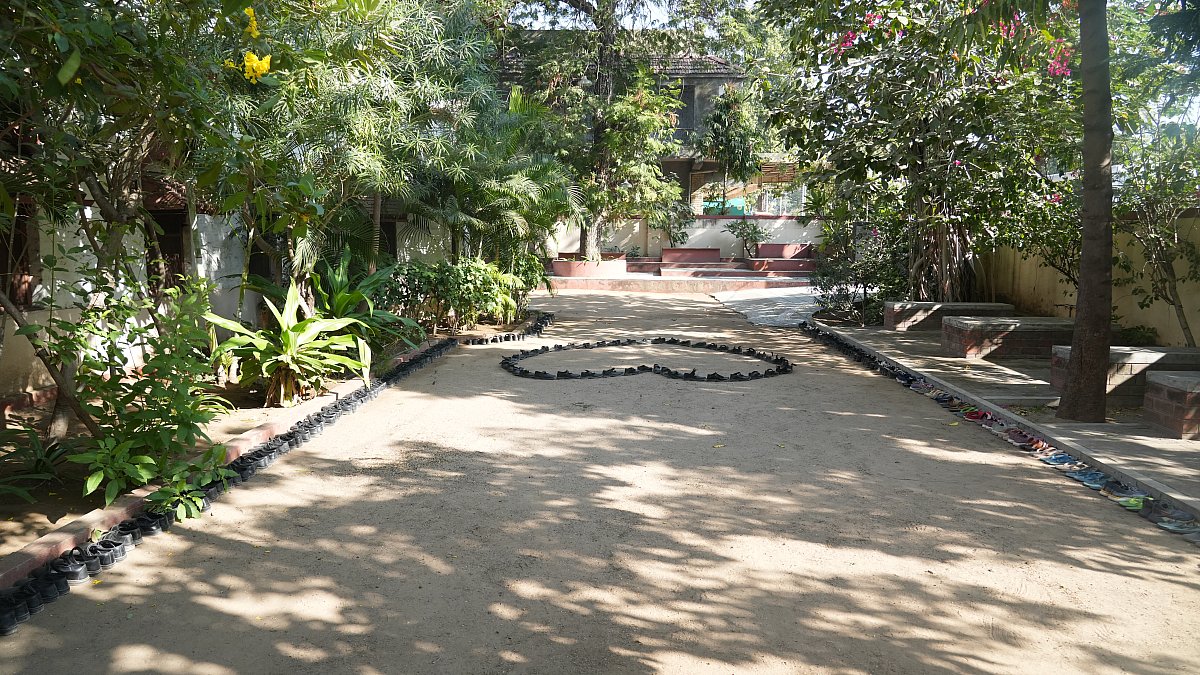
#2) When everything is sacred, we awaken heart intelligence. And it's contagious.
Behind the scenes, there's a CIA team – Compassion in Action. :) All day long, these CIA agents are looking to unleash contextual and creative acts of kindness for anyone and everyone. They gather intel from participants' public talks and websites, from conversations with other volunteers, from tuning into dynamic kitchen table interactions. En route from the airport, one guest says to another, "Oh, I would love to have a Diet Coke right now." Next thing you know, one volunteer tells another and a third, and a six-pack is mobilized in his room. When the co-founder of B-Corp spoke about how "B" was a nod to Gandhi's be-the-change, one of the volunteers gave him his own "hand-spun" (khadi) t-shirt with that inscription. And it's not always easy choices – what happens when someone needs meat on a vegetarian campus? How is the generous response when someone asks for a match stick to light up a cigarette? How does kindness show up when a native cat bites a guest? Yet, the intelligence of the collective heart unfailingly guides the way. When a participant remembered his mother's passing last year and spoke about his connection to a deer at the very moment she passed, Bhumika and Drishti mobilized a hand-made deer and left it by his room that night. If someone mentions a quote they love, volunteer artists will hand-draw a bookmark with that quote and casually slip it under their door.
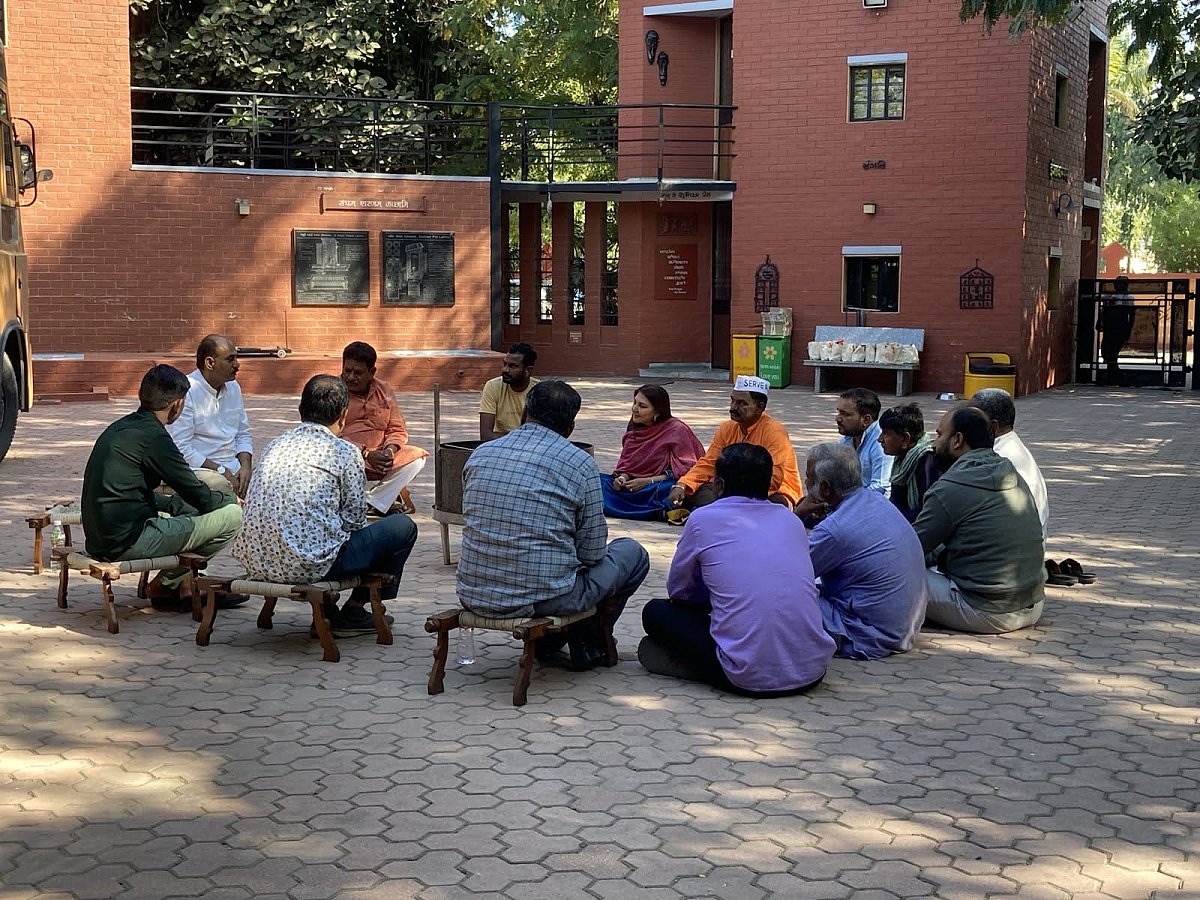 Such heart intelligence is a force everyone feels, even if it isn't always explicable. Or as the quote on a wall at ESI reads, "Heart knows today what the mind will know tomorrow." And it changes the eyes through which we perceive the present moment. It's the same circumstance, but we see it differently. We see more. A different kind of love logic takes over.
Such heart intelligence is a force everyone feels, even if it isn't always explicable. Or as the quote on a wall at ESI reads, "Heart knows today what the mind will know tomorrow." And it changes the eyes through which we perceive the present moment. It's the same circumstance, but we see it differently. We see more. A different kind of love logic takes over.
In the kitchen, Anamika and Meera prepped the menu for weeks beforehand. They created a "farm to table" approach where they knew where each carrot in the carrot-halwa was coming from. You could feel their joy just by reading the menu tags with enthusiastic adjectives! As they served the food, they noticed what kind of food people loved (amaranth muesli had to be reordered!) and on the last day, they quietly shared, "Today's menu items are things that people ate the most." Lucy, as a participant, would often offer a hand "to do anything – washing pots, sweeping, you name it!" At the end, she cited one of her retreat highlights: "Meera was caring for a guest, often at midnight, who was sick. When I said, 'But you have to get up early', she said, 'Oh I'm the lucky one! It's an opportunity to love.' I found myself saying that quietly to myself as I did different things on returning home."
That's love logic. And it's wildly contagious. If someone taps into it even momentarily, it propels another to fall into that pattern – by the organic pull of nature – and just keeps multiplying ceaselessly. Gandhi used to say that such a "law of love" is more precise than even electricity or gravity, and we owe it to ourselves to further experiment with it.
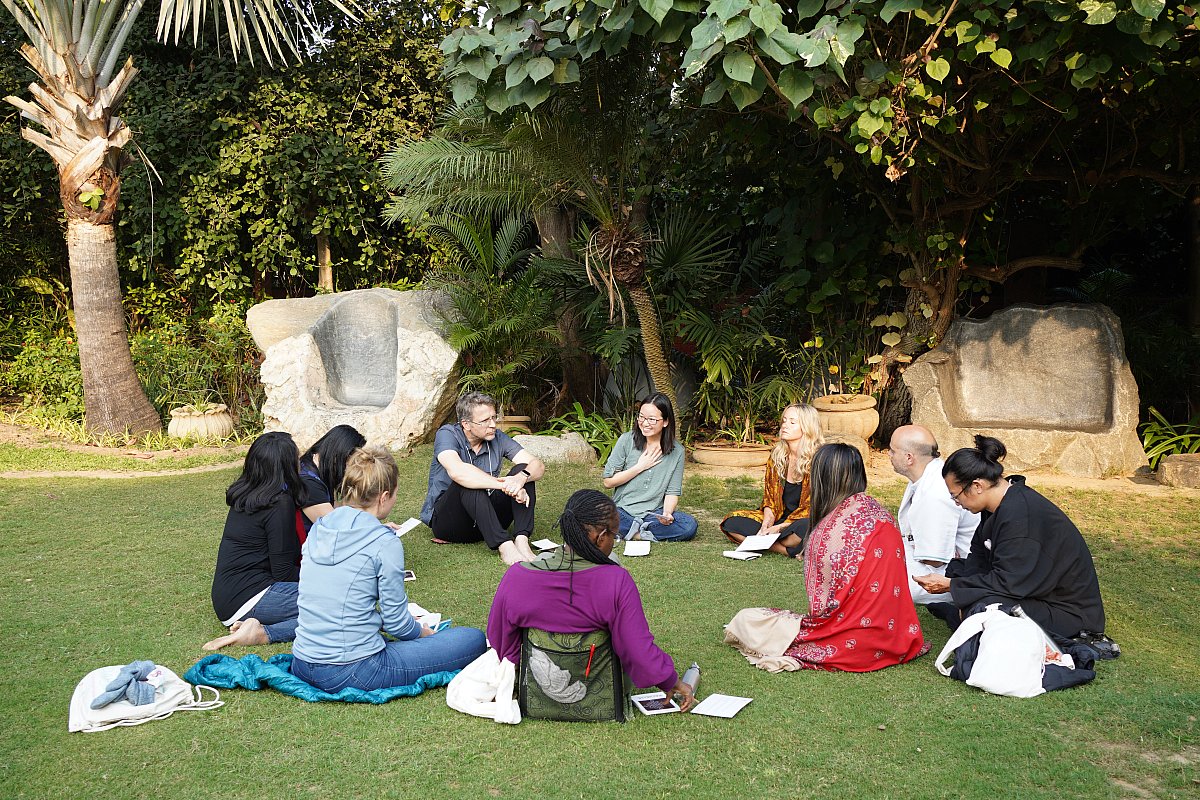
Pretty soon, everyone becomes a CIA agent! One secret Santa is serving another secret Santa. One night, Nimo came late into the dorm and was fast asleep; two volunteers, Garvit and Harsh, super quietly put an entire mosquito net on his bed without waking him! When one of the pillars of the whole retreat fell sick, he quietly retreated into his bed without drawing any attention to himself; but volunteers would visit him and recap inspiring tidbits to make him feel included. Everyone's thinking of each other – just like at the end of meals, everyone's creatively snagging each other's plate to wash it for them as a small act of kindness.
 Even outside vendors, who have no conceptual framework for this, can't help but get infected. The A/V guys who handled our community evening said his team has managed public events with hundreds of thousands of people, but they've never seen 250 people come so alive – without any intoxicants, celebrities, or hierarchies. Very cutely, he asks, "Now that I have this heart pin, is that my guest pass to serve next time?" Similarly, after the retreat ended, volunteers held a circle with the kitchen crew – who prayed to the stoves, before starting each day's meal. One of them, with tears in his eyes, said, "I saw everyone doing three steps and a bow today. Something inside me said this was holy, and I recorded it on my phone, so I could also do that one day."
Even outside vendors, who have no conceptual framework for this, can't help but get infected. The A/V guys who handled our community evening said his team has managed public events with hundreds of thousands of people, but they've never seen 250 people come so alive – without any intoxicants, celebrities, or hierarchies. Very cutely, he asks, "Now that I have this heart pin, is that my guest pass to serve next time?" Similarly, after the retreat ended, volunteers held a circle with the kitchen crew – who prayed to the stoves, before starting each day's meal. One of them, with tears in his eyes, said, "I saw everyone doing three steps and a bow today. Something inside me said this was holy, and I recorded it on my phone, so I could also do that one day."
When the density of such heart intelligence skyrockets, when reminders of the sacred are found at every corner, it's almost as if we remember – and re-member collectively.
#3) When heart intelligence hits a critical threshold, a murmuration awakens.
It's easy to imagine how a group would come alive with a simple shared credo – do *whatever* it takes to make someone else happy. Such intrinsic motivation multiplies. Maybe on Day 1, a few kindness ninjas are doing acts of compassion. But if they keep it up, hour after hour after hour, pretty soon a contagion takes over. Not because of a scheme they have plotted, but because we're all wired to respond to love with greater love. In no time, the line between giver and receiver blurs, because today's giver was yesterday's receiver. And soon enough, the boundaries of unique identities blur and they become agents of a collective flow that is exponentially more potent.
When we operate from the heart, doership starts to dissolve. Even science tells us that the boundaries between personal coherence, social coherence, and planetary coherence don't have sharp lines because they all influence each other constantly. Vinoba Bhave, Gandhi's successor whose work impacted millions and was on the cover of Time magazine, said he never actually started a project. History books will tell us otherwise, but Vinoba's point is subtler – "I caught a strand of emergence from the past conditions, I'm holding it responsibly, and then I'm lightly passing it on."
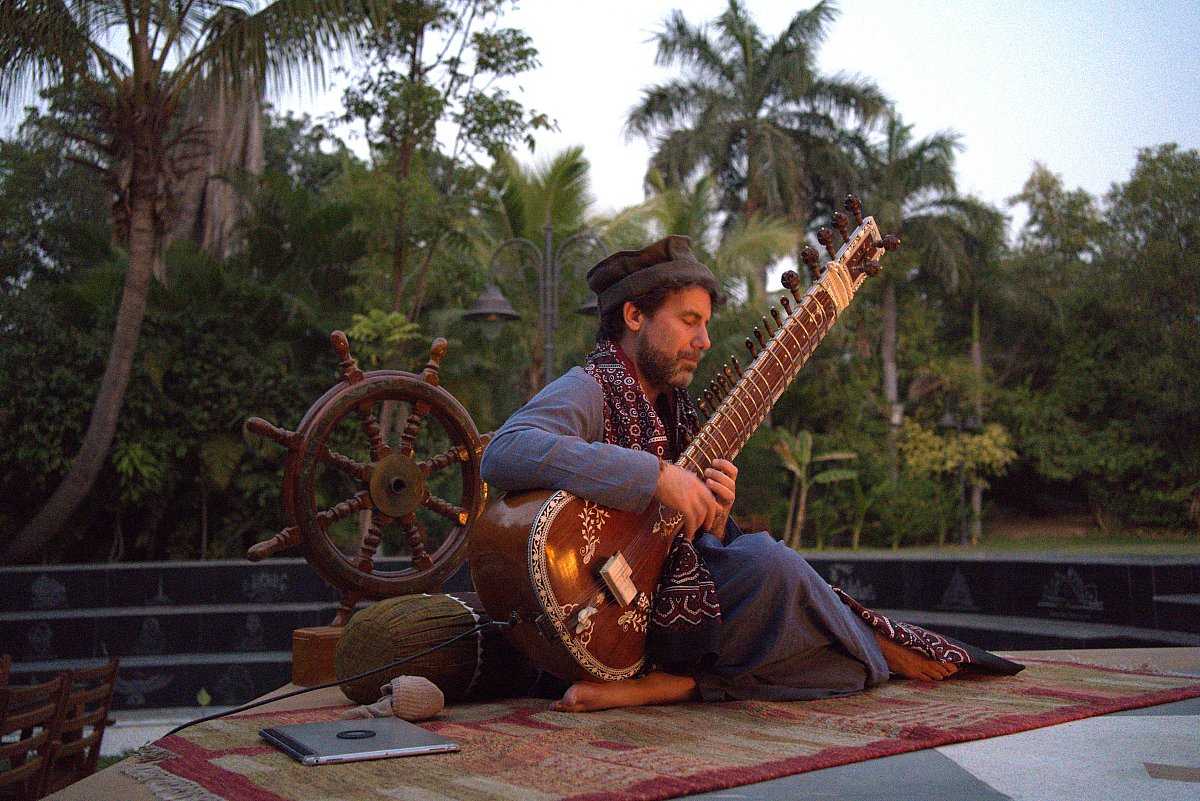 On a dining table with a few randomly assembled folks, Paul tells us how at the age of 12, he put on a CD, and "I lost all sense of myself, I don't know what happened." It was music by Ravi Shankar, and right then, he decided that his life would be dedicated to playing the Sitar – and it so happened that Ravi Shankar became one of his primary teachers. "Years later, I was playing at an event in Mexico, and I could see myself playing the music. Before that experience, I saw my music as a function of my will," he says, only adding with a giant laugh: "But now, when I see my name in front of my music, a part of me always adds a qualifier – music by a body named Paul."
On a dining table with a few randomly assembled folks, Paul tells us how at the age of 12, he put on a CD, and "I lost all sense of myself, I don't know what happened." It was music by Ravi Shankar, and right then, he decided that his life would be dedicated to playing the Sitar – and it so happened that Ravi Shankar became one of his primary teachers. "Years later, I was playing at an event in Mexico, and I could see myself playing the music. Before that experience, I saw my music as a function of my will," he says, only adding with a giant laugh: "But now, when I see my name in front of my music, a part of me always adds a qualifier – music by a body named Paul."
As our gaze shifts from the linearity of the doer and receiver, we notice that the real party is what's flowing in between them. Because this party is other-centered, it is multiplying organically, by nature's accord. When such regeneration hits a certain threshold in a shared space, unexpected "murmurations" start to arise. No one starling in a murmuration can know the entire formation, and yet, there is a different kind of satisfaction in playing our part in the field of a deeper organizing principle.
During a lunch break, Jayeshbhai asked Xue if she wanted to take a walk to the nearby Kabir Ashram. She went. On the way, they passed Chaz's room; he was sleeping but heard an inner voice that asked him to wake up. A bit dazed and confused, he walked out, and Jayeshbhai asked him, "Hey you wanna join us?" He went. Along the way, Xue meets an old woman and has a sacred encounter that leaves her in tears. Spontaneously, she feels called to give her sacred peacock earrings, offered to her by a Tibetan elder. They land at Kabir Ashram, and there are six peacocks dancing – a rare sight that Jayeshbhai had never seen in this location. Combined with other happenings, Chaz was also profoundly shaken up and moved to tears, too.
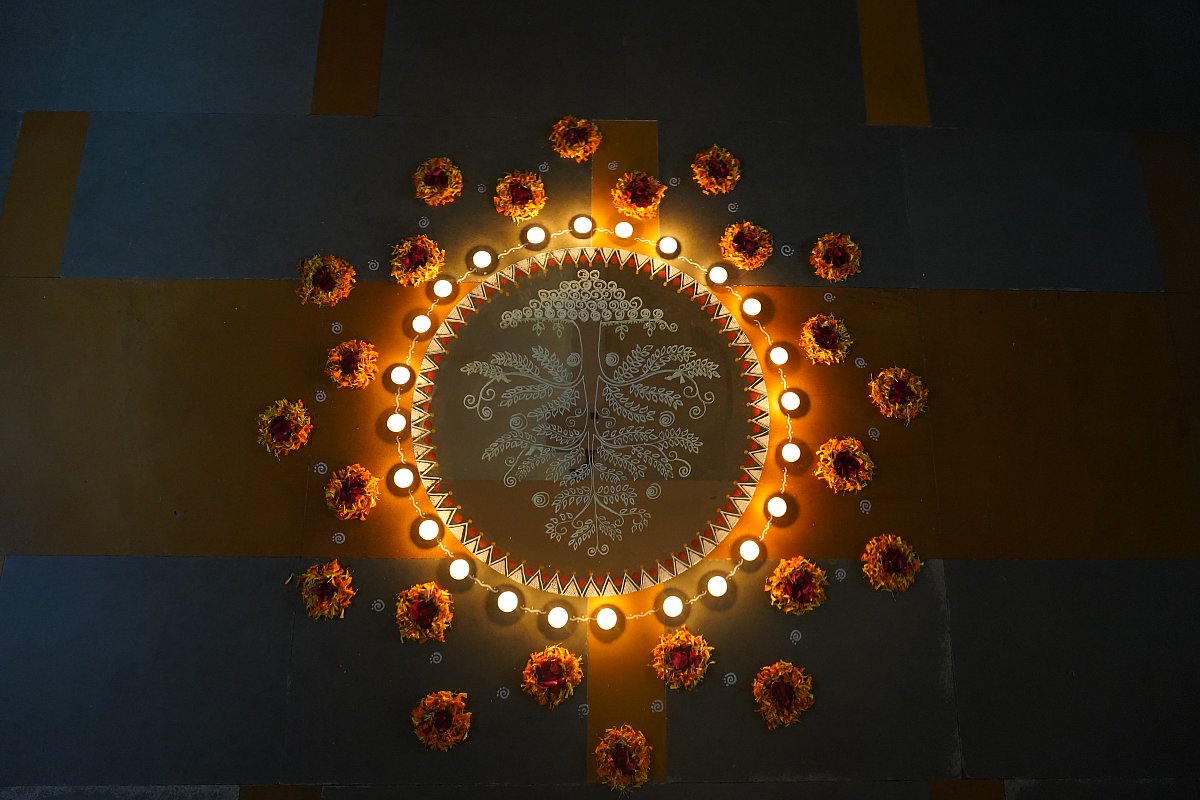 Such events, complete with their mystical underpinnings, were happening on the hour. If it was one or two, you might frame it as spectacular. But after a while, you realize that there's a deeper story at play. Like that poem, I Double Dare You: "Tell me the story of your life, without once touching mine." It's impossible. When "the red of your heart spills, into the red of the rose spills, into the red of the sunset spills, into mehendi of your hands", magic happens. It's magic from the lens of an individual mind, but it's natural wisdom from the lens of the more encompassing heart intelligence.
Such events, complete with their mystical underpinnings, were happening on the hour. If it was one or two, you might frame it as spectacular. But after a while, you realize that there's a deeper story at play. Like that poem, I Double Dare You: "Tell me the story of your life, without once touching mine." It's impossible. When "the red of your heart spills, into the red of the rose spills, into the red of the sunset spills, into mehendi of your hands", magic happens. It's magic from the lens of an individual mind, but it's natural wisdom from the lens of the more encompassing heart intelligence.
In such a context, we no longer feel like a wave in the ocean, but rather an ocean in which the waves rise and pass. A quiet confidence of being alive comes into focus.
Howard Thurman, who introduced Dr. King to the work of Gandhi, once said, "Don't ask what the world needs. Go out and do what makes you come alive, because what the world needs most are people who have come alive." Without a cultivated field of awareness, one can translate that as – "Hey, eating ice cream makes me come alive." (Yes, that's my personal bias. :)) But in a field of heart intelligence, it becomes clear that no sensory stimulus can make you come alive; and no thought can make you come alive. What Howard Thurman is inviting us into is a possibility, amidst the noise of our senses and mind, to find a throughline from our particularity to Rumi's field "beyond wrong-doing and right-doing" -- through the very small act in front of us. He then adds,
“Now if I hear the sound of the genuine in me, and if you hear the sound of the genuine in you, it is possible for me to go down in me and come up in you. So that when I look at myself through your eyes having made that pilgrimage, I see in me what you see in me and the wall that separates and divides will disappear and we will become one because the sound of the genuine makes the same music.”
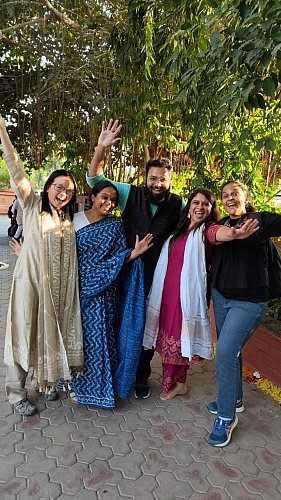 Prior to our second community night, which featured lots of stories and songs and JOY, :) one of the volunteers preemptively apologized to the lawn – yes, the grass. "Later tonight, a whole bunch of people are going to walk on you, and even jump up and down, but please know that they are love-warriors. Do bless them." Similarly, during our silent dinner evening, as volunteers created the artful centerpiece, they went around campus looking for statues of divinities; except they would do three-steps-and-a-bow to pick up and sing chants from that tradition on the way back! In one session, Bijan sang a heartfelt Islamic prayer, as everyone's eyes were closed in silence. The next morning, Harish noted, "Do you know who was the one person in the room who knew all the words to that prayer, and sang along with their complete being?" It was Siddhartha – a renunciate who has dedicated the last 40 years of his life to the study and practice of Hindu scriptures.
Prior to our second community night, which featured lots of stories and songs and JOY, :) one of the volunteers preemptively apologized to the lawn – yes, the grass. "Later tonight, a whole bunch of people are going to walk on you, and even jump up and down, but please know that they are love-warriors. Do bless them." Similarly, during our silent dinner evening, as volunteers created the artful centerpiece, they went around campus looking for statues of divinities; except they would do three-steps-and-a-bow to pick up and sing chants from that tradition on the way back! In one session, Bijan sang a heartfelt Islamic prayer, as everyone's eyes were closed in silence. The next morning, Harish noted, "Do you know who was the one person in the room who knew all the words to that prayer, and sang along with their complete being?" It was Siddhartha – a renunciate who has dedicated the last 40 years of his life to the study and practice of Hindu scriptures.
It's the same music everywhere, when we're tuned into the sound of the genuine.
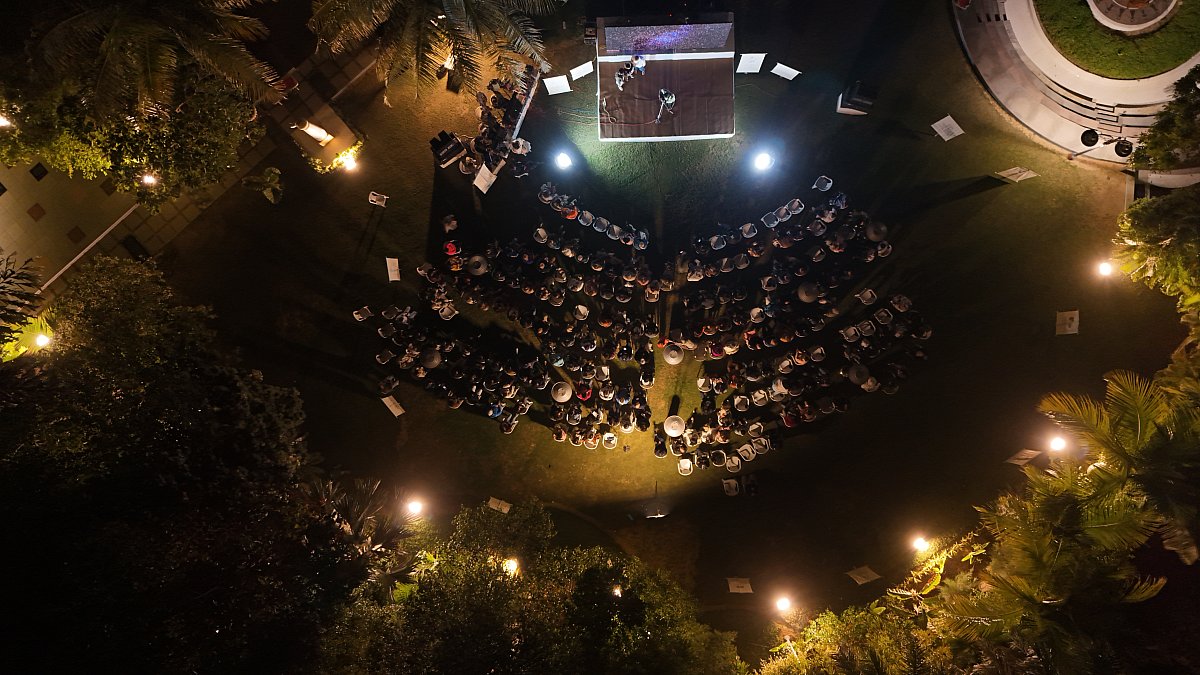
#4) When murmurations awakens, social permaculture regenerates it.
If we find ourselves in moments of collective flow, what does it take to regenerate it?
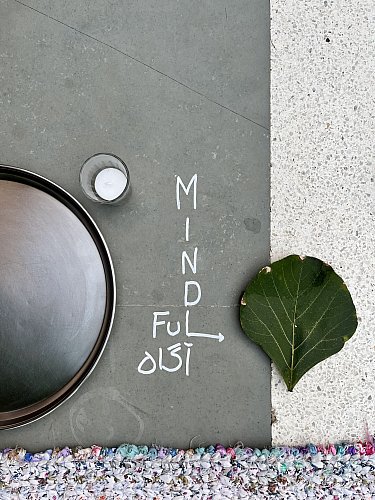 A Japanese farmer named Fukuoka innovated a farming technique called permaculture, where he wouldn't use fertilizers or pesticides, or even weed or till the soil. He called it "do nothing farming", by which he meant that if you tend to the invisible relationships below the visible iceberg, nature will take care of the tip of the iceberg.
A Japanese farmer named Fukuoka innovated a farming technique called permaculture, where he wouldn't use fertilizers or pesticides, or even weed or till the soil. He called it "do nothing farming", by which he meant that if you tend to the invisible relationships below the visible iceberg, nature will take care of the tip of the iceberg.
At Gandhi 3.0, one might say we practiced social permaculture.
Social permaculture is the art of letting nature ignite, manage and regenerate collective formations in a human context. To let nature operate the murmuration, its center of gravity has to be intrinsically motivated – that's the lever through which nature can be our conductor. And secondly, there has to be emptiness at the center. Any agenda or outcome is antithetical to this quiet surrender to the wisdom of nature. Only emptiness can hold the fullness of infinite possibilities that intrinsic motivations unlocks.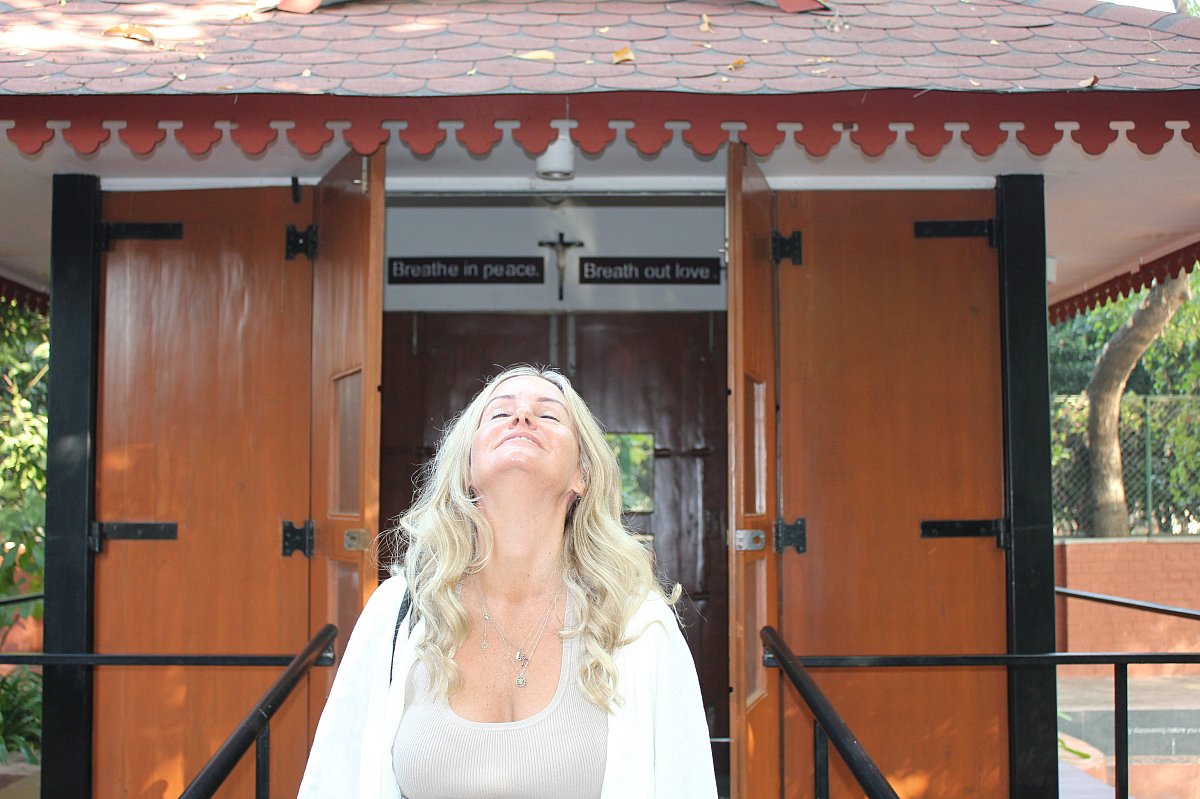
While this may sound like common sense, it radically upends the foundational building blocks of modern-day systems – money, fame and power.
- Money is a tool that helps replace relationships with transactions, in the interest of short-term efficiency. From a social permaculture point of view, though, relationships are the bridge to intrinsic motivation, which is the baseline to reconnect with nature. Hence, the premium shifts to non-financial expressions of wealth (like volunteering)!
- Fame is a broadcast capacity in one-to-many formations. But in a many-to-many murmurations, orchestrated by the larger field of consciousness and heart intelligence, a"deepcast" process is far more effective. As Jac insightfully shared,"Mind wants to broadcast because it is seeking a connection that can only be obtained through deepcast."
- Power cannot be centralized in a network when every connected node can be an agent for the larger field of consciousness. Or as Mother Teresa might put it, "pencil in the hands of God." Hence, traditional leadership has to give way to"leadership" that aligns the gifts of peer-to-peer synergy with the larger emergence of nature.
This isn't just theory. For the last 25 years, ServiceSpace has experimented boldly with the "better party" at the intersection of multiple forms of wealth, deepcast, and laddership.
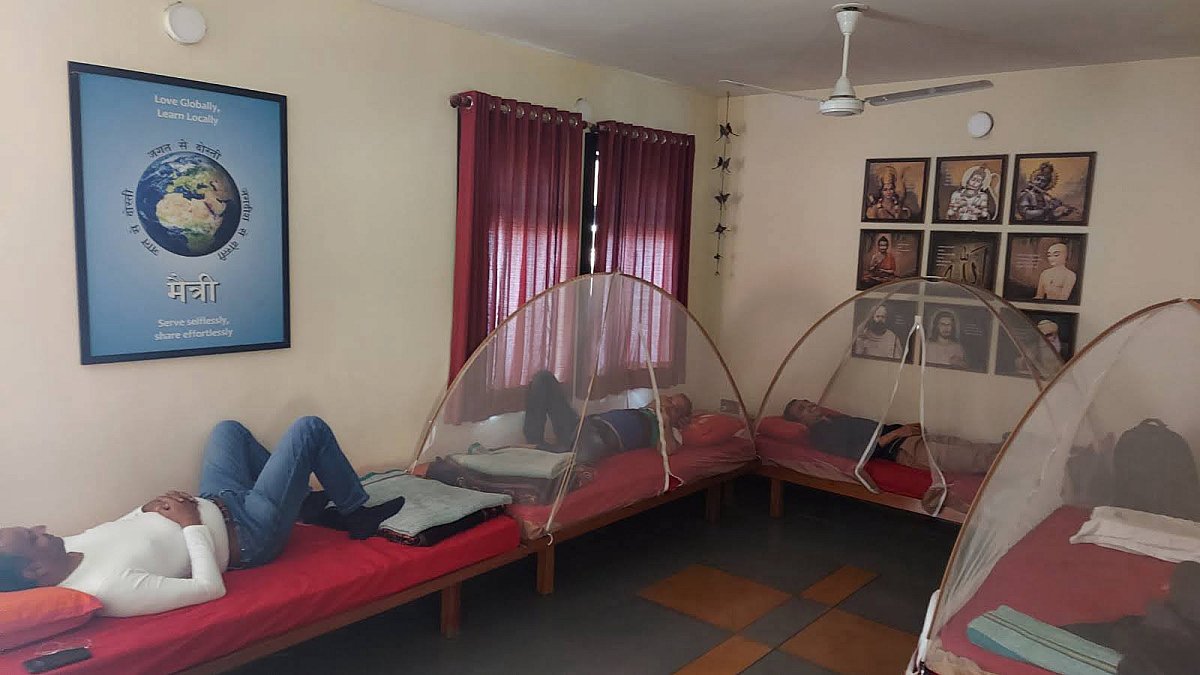 In one of the guest homes, three volunteer drivers were sleeping in the hallways for the entire 10 days of the gathering. No matter what time of the night, they would pick up each guest as if they were family. What no one knew is that one of those drivers was one of Asia's largest diamond merchants, another is a highly reputed fashion designer, and a third just exited from a publicly traded finance company that he had started. All of them have many cars and many chauffeurs, in their daily lives. But they're taking time off from their busy schedules to live rustically, chauffeur others, hoist up welcome-home signs up to 8 times in one night, and go largely unnoticed. At the last retreat, one of these drivers, Gulshan, shared a stunning process of finding the holy in doing dishes: Five Stages of Doing Dishes. To top it off, each of them adds before leaving every time: "Thanks for the opportunity to grow in generosity."
In one of the guest homes, three volunteer drivers were sleeping in the hallways for the entire 10 days of the gathering. No matter what time of the night, they would pick up each guest as if they were family. What no one knew is that one of those drivers was one of Asia's largest diamond merchants, another is a highly reputed fashion designer, and a third just exited from a publicly traded finance company that he had started. All of them have many cars and many chauffeurs, in their daily lives. But they're taking time off from their busy schedules to live rustically, chauffeur others, hoist up welcome-home signs up to 8 times in one night, and go largely unnoticed. At the last retreat, one of these drivers, Gulshan, shared a stunning process of finding the holy in doing dishes: Five Stages of Doing Dishes. To top it off, each of them adds before leaving every time: "Thanks for the opportunity to grow in generosity."
So, then, why did Gandhi 3.0 need 11 thousand volunteer hours? Multiple forms of wealth. Why did people say yes to fly all over the world for a gathering whose outcomes they had no clue about? Deepcast. How did so many guests experience life transformations, when no one was trying to create them? Laddership.
And that's just the tip of the iceberg. :)
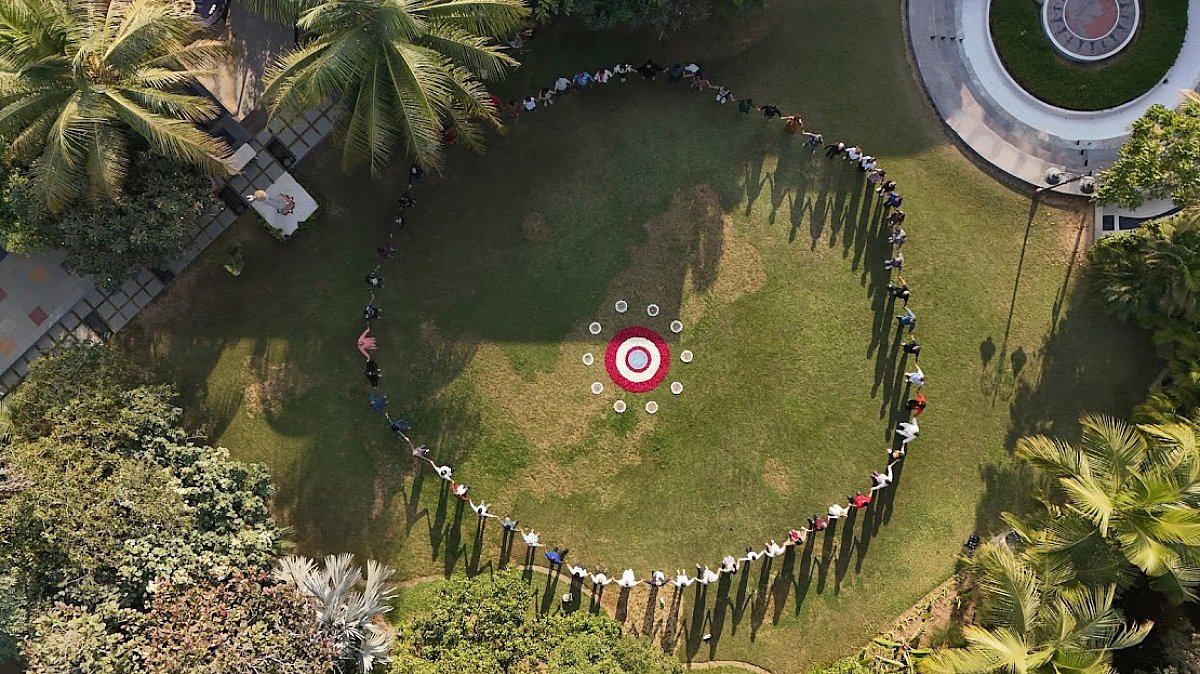
In summary, thank you for co-creating such an experiment.
With the smallest act of kindness, mundane is elevated to holy ground. As its echoes open our hearts, the invisible intentions of compassion build noble bonds and charge the space between us. Love begets more love. Virtue goes viral. In that murmuration, unexpected emergence orchestrates its dance in all directions. With a heart of reverence, "ladders" of the sacred space "do nothing" – simply practicing social permaculture's art of intervening in the gentlest possible way.
Gandhi's quote, then becomes clear: in a gentle way, you can shake the world. In fact,that'ss the only thing ever can. Everything else feels like a cheap earthquake.
With emptiness at the center, doubling down on intrinsic motivations, a full heart responds with great joy at this kind of a ServiceSpace invite: That's what everyone queues up for! Head-scratching, but heart-warming.
Bucky Fuller once said, "Don't fight the old paradigm. Build a new paradigm and render the old one obsolete."
In other words, throw a better party. Maybe this is it. :)
"One of the greatest weeks I've ever lived," a divine singer, who sang with Celine Dion, wrote. A Bhutanese educator, who schools the King's kids, told the circle how she understood love for the first time. A change-maker called it a "stunning growth spurt", an entrepreneur called it a"family that was always mine but I never knew about", a spiritual mystic called it "the bridge between one world and another," a venture capitalist wrote that she was "forever changed". Beyonce's pastor (yes, The Queen Bey) wrote, "I am rarely left without words but I am still marinating in the bounty of love." Perhaps 90% of the attendees would've been in tears at one point or another; a close friend of Dalai Lama shared, "I haven't cried like this in a very, very long time." "I've organized, facilitated, hosted scores of group programs over my career, and I must say, I've never even imagined something like this." A YouTube influencer from Haiti called it "the most transformative experience of this decade" while a philanthropist from Vietnam said, "It unleashed a soul force with more strength and breadth than thousands of hours sitting on the cushion over the last twenty years!"
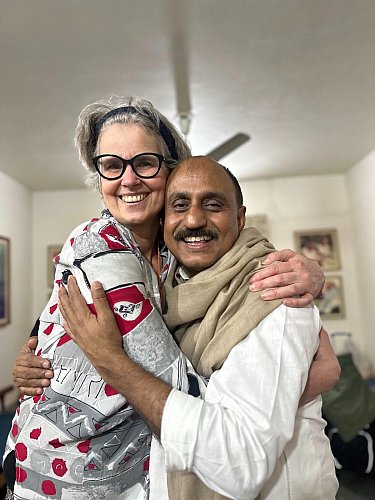 A few months ago, in Germany, Imke received that infamous heart pin. "This isn't for you and it isn't from me," she was told. "It's a gift from underprivileged women by the Gandhi Ashram who made this by hand. And as you wear it, if someone says they like, you pay it forward to them. Thank you for being a steward of this flow of love." Hearing this invitation to decenter herself in presence of grand web of love, she teared up. As she learned more of the volunteer job description above, she couldn't resist signing up to fly all the way across the world, find a cat sitter for her beloved 18 year old, and serve with no strings attached. From the very first day she arrived, she was frequently tearing up – even while being behind the camera.
A few months ago, in Germany, Imke received that infamous heart pin. "This isn't for you and it isn't from me," she was told. "It's a gift from underprivileged women by the Gandhi Ashram who made this by hand. And as you wear it, if someone says they like, you pay it forward to them. Thank you for being a steward of this flow of love." Hearing this invitation to decenter herself in presence of grand web of love, she teared up. As she learned more of the volunteer job description above, she couldn't resist signing up to fly all the way across the world, find a cat sitter for her beloved 18 year old, and serve with no strings attached. From the very first day she arrived, she was frequently tearing up – even while being behind the camera.
Filmmakers typically try to make the film better than what they see in real life. In this case, though, it was the opposite – reality was more beautiful than what could be captured in film.